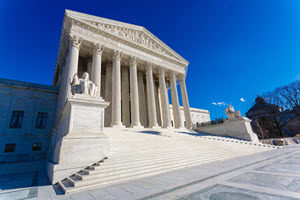Supreme Court Starts Term with a Vacancy – What Does That Mean?October 15, 2016
The Supreme Court Term and the Impact of the Vacancy

As many of you know, the United States Supreme Court begins each new term on the first Monday of October. The Supreme Court term has started, and a number of cases will be heard.
Interestingly, the Court still has one vacancy due to the death of Justice Antonin Scalia. While President Obama has nominated Merrick Garland to the bench, he has not been considered for hearings, and may not be considered for the vacancy at all.
Why is this important? This is important because the election of the new President may result in the filling of the outstanding Supreme Court vacancy. While it is still possible that Congress can confirm Judge Garland during its “lame duck” session, (meaning, the period of time after the election until the newly elected officials are sworn into office in January,) it is just as likely that the Senate will not consider hearings, and will expect that either the new President, Hillary Clinton or Donald Trump, will make this appointment.
Obviously, this has very interesting consequences for many national issues. Currently, the Court is considered to have an even split of conservative and liberal Justices. Moreover, even when the Justices do not vote along ideological lines, it can still result in a tie. When the Supreme Court’s decision ends up in a tie, this means that the underlying Appellate decision is upheld, and there is no Supreme Court precedent. This is problematic for several reasons:
1) First, the Supreme Court is not concluding business in a satisfactory fashion. Litigants deserve to have a decision, and a 5-4 decision is certainly more preferable than the current state of 4-4.
2) The underlying Appellate decision will apply only to the Circuit Court where the decision was upheld. This creates confusion because it is possible that Appeals Courts, sitting in different Circuits, will come to vastly different conclusions. One of the functions of the United States Supreme Court is to bring uniformity to the law.
Finally, the Supreme Court must have uniformity in making policy on administrative questions as well. The Supreme Court supervises the other Federal Courts, and it should speak with one voice. The Chief Justice is generally considered to hold the key to administrative power, but the other Justices contribute to the formulation of Federal Rules and other matters.
As always, it is very important for you to vote. Your vote counts when you consider the consequences of your choice, and the many responsibilities of the President.
If you have questions, or an interest in the Supreme Court or other issues, please feel free to contact the law firm of Daley Zucker Meilton & Miner, LLC at (717) 724-9821.








